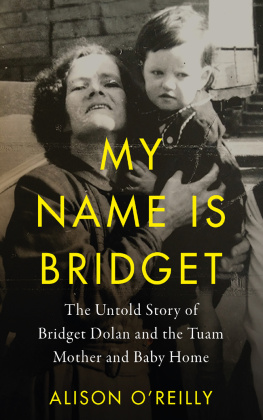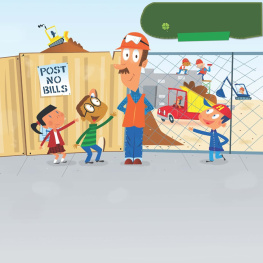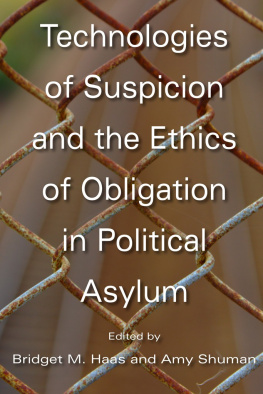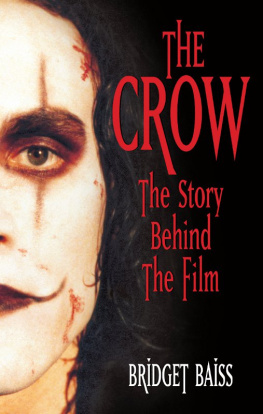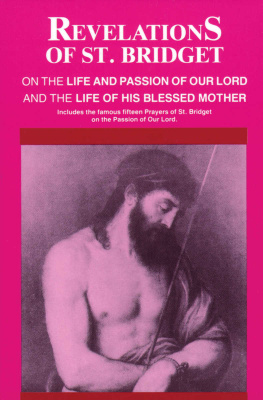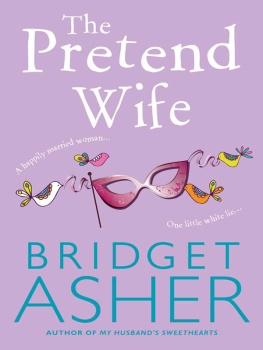A LITTLE REBELLION
A LITTLE
REBELLION
BRIDGET MORAN

A LITTLE REBELLION
Copyright 1992 by Bridget Moran
All rights reserved. No part of this book may be reproduced in any part by any means without the written permission of the publisher, except by a reviewer, who may use brief excerpts in a review.
ARSENAL PULP PRESS
#101-211 East Georgia St.
Vancouver, BC
Canada V6A 1Z6
arsenalpulp.com
The publisher gratefully acknowledges the support of the Canada Council for the Arts for its publishing program, as well as the support of the Department of Canadian Heritage and the B.C. Arts Council.
Edited by Linda Field
Typeset by the Vancouver Desktop Publishing Centre
Printed and bound in Canada by Kromar Printing
CANADIAN CATALOGUING IN PUBLICATION DATA:
Moran, Bridget, 1923
A little rebellion
ISBN 0-88978-252-0
1. Moran, Bridget, 1923-2. Social workersBritish Columbia
Biography. 3. Social serviceBritish ColumbiaHistory. I. Title.
HV40.32.M67A3 1992 361.3'2'092 C92-091635-X
This book is dedicated to the memory
of my courageous Irish mother,
Rose Anne Drugan 1890-1975
"I hold that a little rebellion, now and then, is a good thing, and as necessary in the political world as storms in the physical."
THOMAS JEFFERSON
in a letter to James Madison, 1787
PROLOGUE
On November 4, 1951, as I stepped off the train into a fog-filled morning on Cordova Street in Vancouver, fatigued and a bit dizzy, I thought, "I wonder what the future holds for me here in British Columbia?" I had just completed three days and three nights sitting in a coach on the Canadian Pacific Railway. I had said goodbye to Toronto, my mother, my brother and sisters, to my university career, and to the friends I had made over the years. As the train rattled its way along the icy tracks I had watched a large part of Canada disappear behind me like a wintery grey ribbon, and in those long hours spent gazing out of the train window, I thought about the past and pondered my future.
I was twenty-eight years old and already I had had a variety of careers: country school teacher in Saskatchewan, a two-year stint in the Women's Royal Canadian Naval Service during the Second World War, five years and some months attending the University of Toronto, at the same time working as a cashier, a waitress, an elevator operator, and in the summer months, a cabin girl in a fishing resort in northern Ontario.
Like the rest of humanity there were many sides to my nature. Perhaps because of my Irish heritage I was gregarious, fond of parties, singing, dancing, and keeping long hours. Balancing this almost excessive sociability I was an avid student and a lover of books. I was also a political creature, ready at the drop of a hat to debate the need for social justice, economic democracy, or the peace movement. In common with many other Canadians the poverty which had plagued my childhood during the Dirty Thirties had forged my political creed; that creed also owed much to the fact that the world in which I grew up was nearly as male-dominated as it had been two hundred years before when the Earl of Chesterfield wrote, "Women then are only children of a larger growth."
In 1937, I was fourteen years old and one of five children in the Drugan family in the village of Success, Saskatchewan when my father died in Qu'Appelle Sanitorium after a long bout with tuberculosis. For years before his death and for some years afterwards, my family survived on the bounty of Mother Welfare, or what in those days was called relief. Years later I did a little mental arithmetic and reckoned that during the Depression years my mother had received ten cents a day to feed and clothe me. With the Second World War engulfing much of the world, I put on the king's uniform and suddenly the government came up with $1.10 per day as my basic wage along with food, shelter, medical, transportation, and all the perks that went along with being in the military. I had never been able to reconcile the difference between those two figures: ten cents a day as opposed to one dollar and ten cents plus many fringe benefits.
Growing up as I did with my parents' stories of Ireland's struggle for independence and with my personal experience of the poverty syndrome, I do not remember a time in my life when I did not believe that poverty and war and discrimination of every kind were the three greatest evils in the world. My studies in philosophy, literature and history during my years at university only served to reinforce the judgements I had reached earlier through more personalized experience.
I was also politicized by my experiences as a female in a world that seemed to carry the warning, 'For Men Only.' The limited career choices I had as a girl, my lack of sexual freedom compared with my brother and my male friends and the inhibitions which resulted from these restraints, the not-so-subtle social pressures to marryI had never ever wanted to be a man but I passionately wanted to share some of the freedoms men enjoyed.
My view of the world as male-dominated took a great leap forward in 1950 when I graduated from the University of Toronto with a gold medal and first class honours in Philosophy, English and History. I wanted to continue my studies in history with a view to teaching at the college or university level. As a veteran I was guaranteed one month's financial support at a university for every month I served in the armed forces. Beyond this time limit the Department of Veterans Affairs continued to give financial support if the veteran achieved high second- or first-class marks. I expected that in view of my academic success the department would automatically continue to support me in graduate schoolafter all, hundreds of other veterans had received just such an extension. It came as a shock to me to discover that Veterans Affairs had conducted an investigation into university history departments across Canada and that the fruits of this investigation did not bode well for me. Their survey disclosed, said the poltroons in Ottawa, that there was no female history professor in any Canadian university or college. This being so, they would be glad to continue to support me if I decided to go into teaching, nursing, or, in a pinch, social work or psychology. I said "Thanks but no thanks," or words to that effect, and stumbled along with my historical studies for another year and some months. As I struggled to find money for books and streetcar fare, I watched fellow students, often men with their second-class marks, continue their studies in the faculties of their choice, supported by the same government department which had turned me down.
Two months into my second year as a graduate history student, I had had enough. I gave the whole thing up. I hopped a Canadian Pacific train and headed for Vancouver and the sanctuary of a younger sister's home.

I was not prepared for the size and the marvelous variety I found in British Columbia when I first arrived in Vancouver. In an atlas, with its brown and green shadings, it looks like any other area in the vast expanse of North America. Far from this sameness, this similarity, however, I discovered a province with a land mass of over one-third million square miles, stretching from the Yukon border in the north through a whole series of snow-capped mountain ranges, turbulent rivers and pristine lakes, through wide valleys and finally on to the ocean with its islands and tides and inlets cut deep into the land.
Next page



